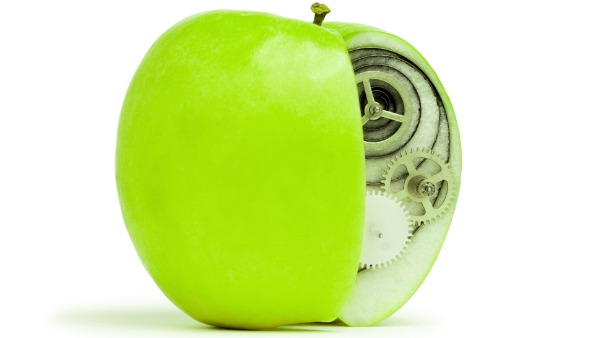Despite what Monsanto and a surprising number of science writers want you to think, GMOs aren’t the only high-tech game in town when it comes to food and agriculture. In fact, there are groups out there that are marrying technology and food that aren’t about inserting bacterial genes into plants and animals.
One such group, the New York City-based company Food + Tech Connect, held its second annual Hack/Meat brainstorming/tinkering session last weekend. The event was designed to “develop technologies that help bridge the divide between pasture and plate.”
About 250 techy types, investors, meat producers, and farmers gathered on the Stanford University campus for a weekend of coding and design. Organizers presented the attendees with a series of challenges, and a panel of judges selected winners who shared cash and in-kind prizes valued at $125,000.
The winner was an intriguing concept called Farmstacker, which the developers describe as “an eHarmony or AirBnb” for farmers. As co-creator and farmer Kevin Watt explained to me, this service would facilitate multiple uses of the same land for different styles of farming. For example, Farmstacker could link up a grass-fed cow farmer with a pastured poultry farmer to “take turns” on the same field. First the cows graze and then, while the field recovers, the chickens can come in and hunt, peck, and fertilize. It could come in handy, considering that access to land is a big problem for farmers, especially young ones.
Farmstacker was one of the few apps to come out of the hackathon that focused on producers rather than consumers. Other award winners included an app to help “cow sharing” and a Google Glass app (built by engineers from Google) that lets you “scan” meat products at the supermarket to get ratings on GMO content or use of antibiotics.
Cool, right? But while access to land is an issue, and bringing farmers into the sharing economy is a great idea, these seem like small-bore solutions to big problems. Now to be fair, the Hack/Meat organizers never said they were going to solve the world’s hunger crisis, but it raises some interesting questions about where our time and resources are best spent, and what the future of agriculture will look like.
In fact, when I spoke to investor Niko Hrdy (no, that’s not a typo), one of the Hack/Meat judges, he echoed my sentiment. He said he greatly admired the passion and ideas of all the attendees, and thought that the effort overall was worthwhile, but “at the end of the day, there is no such thing as having a massive sustainable meat industry. There’s no way we’re going to have grass-fed T-bone steaks for everyone in this world.”
For Hrdy, “alternative protein sources” such as fake meat and synthetic meat are the way to go. (He is, as they say, talking his book: He’s an investor in at least one such company.)
Making fake meat involves using, most often, soy to create products that can replace meat in familiar dishes. (Mark Bittman covered those various options extensively when he was writing about healthier fast food in the New York Times Magazine.) The problem with fake meat is that it perpetuates chemical-dependent monoculture agriculture.
Synthetic meat solves this problem by creating meat in test tubes instead of on the farm. But for all the hype, synthetic meat is still more a thought experiment than it is an actual option for eaters. As in, “If scientists could grow meat in a test tube that was indistinguishable from the real thing, would you eat it?” Um. Maybe!
What these options share, however, is an assumption that the future of food is industrial products that will be made in factories and eaten out of packages. And to be honest, that’s the direction we’re headed now, and it won’t be easy to shift.
To get a taste of this mentality, read David Freedman’s recent cover story in The Atlantic, “How Junk Food Can End Obesity,” in which he suggests that the answer to America’s health woes is for more left-leaning foodie types to buy more fast food, thereby pressuring McDonald’s and its ilk to make their processed meatthings healthier.
If this seems like a stretch, it is, as Grist’s Nathanael Johnson and Tom Philpott at Mother Jones have observed. But in many ways, Freedman represents the conventional wisdom: the belief that technology will fix all of our food problems.
Much of this mentality grows out of corporate-dominated government, and a media that lives off of corporate and research press releases (it even has a name: churnalism). But it’s not just journalistic laziness and a compliant government that contribute to this situation. New discoveries and exciting products are sexy, easy fodder for speculation, and make everyone feel like they’re living in The Future.
The reality, of course, is that technologies do exist that can help the food system and improve productivity, but they focus on boosting the ecological synergies in agriculture (aka agroecology) or use advanced versions of plain-Jane conventional breeding (i.e. marker-assisted breeding). There are also a few good things that involve robots, but generally speaking, it’s not the stuff that gets bloggers and newspaper editors excited. Yet.
But there’s another problem with this technology-will-save-us attitude. It’s not as if we don’t produce adequate amounts of calories to feed every person on the planet — we do! The problem is that too many of those calories are wasted, either burned in car fuel tanks or fed to animals that need a lot of feed to produce a decent amount of meat. And then there are those niggling problems of corruption and infrastructure shortcomings in the developing world that prevent us from getting food to those who need it.
We — and when I say “we,” I mean elites like government officials, corporations, and many affluent voters — don’t want to solve these problems, which are mostly political. Political change is a snore and takes too long. The philosopher Max Weber famously said, “Politics is a strong and slow boring of hard boards.” Sounds thrilling, no?
Technology, we’re promised, is fast and easy. Which is good because, as it happens, we also don’t want to change the way we eat. We want a sacrifice-free, everything-the-same-but-more-of-it future. And that’s not really a future we can have. Not with 2.4 billion more of us on the way.
All of this is not to dismiss the work that folks like Food + Tech Connect are doing. As many of the participants noted, sustainable meat is a booming business where challenges abound that require both technological and traditional solutions.
But our hope for a technological fix to ensuring that adequate food is produced in a sustainable way for a growing population is a crutch similar to putting our hopes in geoengineering to solve the existential threat of climate change: It’s a theoretical, some might say fantastical, solution to problems we know how to solve but don’t really want to.




